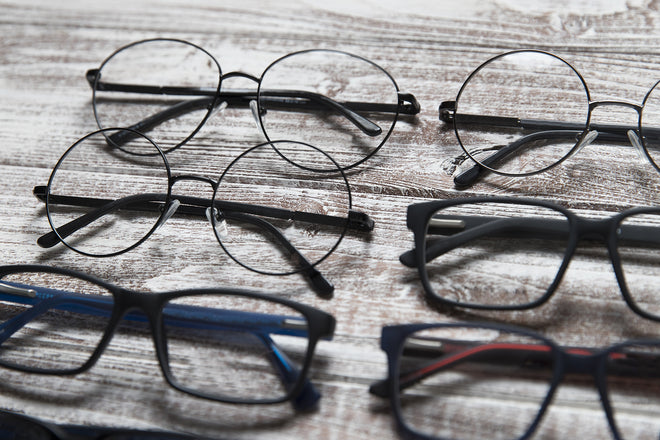Eyeglass frames are usually made from various types of metals or plastics. Sometimes, manufacturers mix and combine materials to create fresh new looks for the market. With so many options, it can be challenging to know which to buy. For example, acetate frames are always in style and are incredibly durable, while metal frames offer a sleek, modern look but are easier to damage.
Comfort, style, durability, and cost should be considered when choosing the perfect frame. In addition to speaking with your eye doctor and our helpful customer service team, you can use this guide to help get you started selecting the perfect frame material.
Acetate Plastic Frames
Acetate eyeglass frames are made from high-quality plastic. It’s a very adaptive material for eyewear and is used to create mixed colors and fun shades, such as warm tortoiseshell.
The material is hypoallergenic, meaning it will rarely cause an allergic reaction. It’s an all-natural and renewable resource and provides an eco-friendly alternative to petroleum-based frames.
Acetate is significantly stronger and much more pliable than traditional plastic. It’s more impervious to pressure, which prevents frames from breaking. Not only is it used for eyewear, but it’s also used in other manufactured products such as packaging, electrical equipment, picture frames, and legos.
See our blog on acetate frames for more information.
Metal Frames
Metal frames come in various materials, offer a minimalist look, and are much lighter than plastic frames. Metal frames are lightweight, which makes them perfect for those with an active lifestyle. And unlike plastic frames, metal frames come in many frame shapes, such as semi-rimless.
There are four primary types of metal frames to choose from:
- Pure Titanium: Pure titanium is nickel-free and hypo-non-allergenic. It offers low density and high strength. Frames made from pure titanium tend to be more expensive than other metals.
- Titanium Alloy: Titanium alloy is ultra-lightweight and includes memory metal frame options. Titanium alloy creates a unique texture that demonstrates both quality and style.
- Stainless Steel: Stainless steel is used to craft ultra-thin frames that are super durable. It’s more affordable than other metals and won’t easily corrode or rust. Stainless steel lacks the “memory metal” property but is still much more resilient than plastic.
- Monel: Monel is the most common metal frame material and contains nickel and alloy.
There are many more options on the market when it comes to metal frame materials. You’ll want to do your own research to determine which material will work best for you and your lifestyle.
Best Material For Eyeglass Frames
The best material for eyeglass frames is going to vary based on your personal tastes and needs. For those with sensitive skin, an acetate frame is the way to go. If you’re out owning the putting green, a metal frame will offer more flexibility. If you’re like most people, you’ll likely want to have a variety of glasses for different occasions.
At ReadingGlasses.com, we offer the world’s largest selection of designer reading glasses and sunglasses. From Coach and Prada to Oakley and Persol, you’ll find the frame material you desire from your favorite brand. With free shipping and returns, it’s risk-free to try out a few new pairs today.





